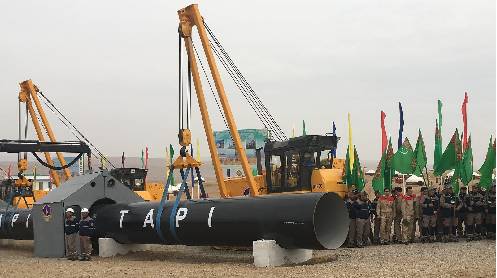These include IP and TAPI pipelines to meet future consumer demand
ISLAMABAD: The top leadership has decided to press ahead with all mega gas projects including the Iran-Pakistan (IP) pipeline to meet the growing consumer demand in future.
Sources told The Express Tribune that the Petroleum Division had conducted a study on the requirement and future demand for gas projects.
The detailed study had been commissioned to define the current and projected supply of gas from domestic and external resources like imported liquefied petroleum gas (LPG), liquefied natural gas (LNG), Turkmenistan-Afghanistan-Pakistan-India (Tapi) pipeline and IP pipeline.
This preliminary study shows that considering the current gas production projections and LNG import of 1,000 million cubic feet per day (mmcfd), materialisation of Tapi, IP, Energas, Tabeer Energy and virtual LNG pipeline projects, there is a potential to increase the current gas volume of 4,684 mmcfd to 7,375 mmcfd.
Sources said that keeping in view the study, the top leadership had directed the Ministry of Energy to expedite work on materialisation of TAPI, IP, Energas, Tabeer Energy and virtual LNG pipeline projects to satisfy consumer demand in future.
They pointed out that Pakistan was facing the threat of penalty to the tune of $18 billion due to its failure to implement the IP project. Tehran claims that it has laid its part of the pipeline to the area bordering Pakistan but Islamabad has not executed the plan.
A major challenge was the sanctions imposed by the United States on Iran over its alleged nuclear programme, which barred Pakistan from building its part of the pipeline.
Pakistan had been waiting for years for the normalisation of the situation between Washington and Tehran for implementing the IP pipeline project.
Islamabad had also issued a force majeure notice to Tehran several years ago but Iran did not respond to the notice.
Read Pakistan procures 2nd LNG cargo from Azerbaijan
In order to avoid the imposition of penalty, Pakistan had stepped up engagements with the Iranian side to find a way out and avoid legal battle in the International Court of Arbitration.
A ministerial oversight committee was working on it and several meetings had been held over the past couple of months to review the project.
Similarly, the Tapi gas pipeline is another strategic project involving four nations. The United States is pushing for implementation of this project that, it believes, will bring the participating countries closer to each other.
A gas sale and purchase agreement had already been signed by all the participating countries. A new controversy emerged during the Pakistan Tehreek-e-Insaf (PTI) government when the Petroleum Division adviser approached Turkmenistan and demanded the review of gas prices.
However, Turkmenistan refused to review the prices, arguing that other participating countries like Afghanistan and India would also call for the price review.
The precarious security situation in Afghanistan was another challenge. Though the ruling Taliban supported the project, there were still security issues in implementing the Tapi project.
Pakistan and Turkmenistan have yet to to finalise the gas transportation agreement and set a transportation fee.
A technical team visited Pakistan on December 20-21, 2023 for initial discussions on the principles of the transportation agreement. Both sides pledged to expedite the finalisation of the project. They also discussed first draft of the Tapi host government agreement.
Read Govt eyes major gas policy reforms
Boosting LPG production
The top leadership has directed the Petroleum Division to finalise a new LPG policy to offer incentives to the companies interested in setting up LPG producing plants.
There is a proposal to offer a 10-year tax holiday for new LPG production and zero petroleum levy.
At present, local LPG producers are paying the petroleum levy whereas LPG importers are enjoying exemption from regulatory duty and 5% general sales tax (GST). The local LPG producers are also paying higher taxes.
It has been proposed to reduce the GST to 5% from 18%. Another proposal is zero duty and taxes on the import of plants, machinery and equipment.
The government may also introduce zero advance income tax instead of the current 5.5% tax and reduce GST from 10% to 5%, which will be gradually reduced annually to 0%.






